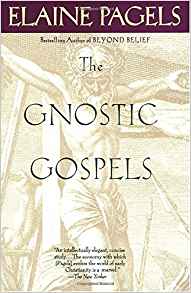
The Gnostic Gospels

The book talks about the Nag Hammadi manuscripts and about when they were made. It also goes into how they were found, how things like this end up in the illegal antiquities market and how some things are confiscated by the government of the area.
It also talks about monotheism, what is resurrection, the fight for what is actually 'true' in the Church and how willing Christians have been to die for their faith, particularly in the past. This part reminds me of the kamikaze in World War II who were willing to die for their Emperor who, at that time, was considered also to be diving.
Some of the other things I found particularly interesting are:
When Emperor Constantine declared Christianity to be the religion of the empire power was given to those who wanted to do away with Gnostic writings. Having any of those books was declared an offense and the books were burned whenever possible.
The Gnostic writings often present a Jesus who was not centered on people doing bad things but was more centered on helping people achieve spiritual enlightenment.
One of the results of the attacks on Gnostic writings was that authority in the Church revolved around a very small group of men, at the first being the apostles themselves. Gradually a wider authority system was set up with a strict hierarchy of priests, bishops and whoever was at the absolute top, with women basically being banned from any areas of authority.
The gnostics were concerned with individual revelation of spiritual truths and how this was just as legitimate, if not more so, then what become the establishment system of the church.
Some of the Gnostic gospels deal with what happened in relation to Jesus after his crucifixion.
The author points out that as far as the various books of the Bible goes no one really knows just who wrote them. (Notice also that there are various versions of stories in the books so they don't always agree with each other which is something you would expect if the books were written by different people.)
The book also goes into the divide between the church authorities and the people who were going to church but did not hold any authority at all.
There's a fascinating section about how people who followed the Gnostic path would get together for meetings and would draw lots to see who would take the role of the priest, the bishop and so on and how the people who took the roles could change from one meeting to another. In other words anyone could become a temporary 'authority' rather then have certain people, always men, put into non-changing rolls of leadership.
The big three religions- Christianity, Islam and Judaism, do not have any positions open for a feminine symbolism whereas many other religions recognize the importance of women.
Some of the writings hold that God has both masculine and feminine attributes. Some hold that there were or are two deities, the main one being female and the male one being the God that Christians pray to.
(I'll point out something here. Christianity refers to a male god whereas many other religions had a female deity. Yet this is all tied in to the fact that we are dealing strictly with human beings who have two sexes. Scientists think that there are probably other intelligent civilizations in our own galaxy and throughout the universe. There is a very good possibility that at least some of them do not fit the male-female model of humans. If so, and if they consider there to be one or more deities, they could be wildly different from what humans pray to. In other words, whoever is 'in charge' might very well not fit the model that Christianity has developed.)
Some of the people who wrote things against gnostics were very nasty in their comments. The act of burning Gnostic writings matches quite well Hitler's burning of books that didn't go along with the Nazi philosophy just as the Gnostic writings didn't go along with the 'accepted' Christian philosophy.
By the end of the second century women were pretty much removed from any positions of authority or importance in the church.
At least one of the Gnostic gospels covers a rather nasty Peter and his remarks to Mary Magdalene.
The book also discusses the politics around the death of Jesus.
Some draw a major difference between a physical Jesus and a spiritual Jesus, saying that the physical Jesus did die on the cross but this left the spiritual Jesus who later talked to Mary, the apostles and others.
Killing Christians in the arena was cheaper then hiring gladiators, etc.
There is a relation between Gnosticism and today's psychotherapy.
What is 'self-knowledge' and how do you get it?
It should be obvious by now that this book has a great deal of interesting information in it. It does have quotes from some of the Gnostic writings but it does not have any of the actual Gnostic books, though.
Back to start of Spirituality section
My Index Page
|
|